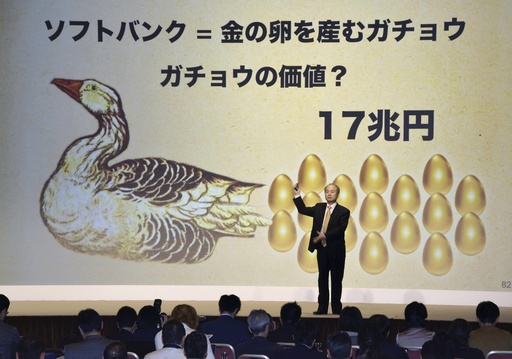
BANGKOK — Japanese business magnate Masayoshi Son and President-elect Donald Trump have revealed a significant plan for SoftBank Group, with an anticipated investment of $100 billion in diverse projects across the United States over the next four years.
Trump explained that this investment, particularly directed towards establishing artificial intelligence (AI) infrastructure, is projected to generate approximately 100,000 jobs. This figure is notably double the 50,000 jobs initially anticipated when Son committed to investing $50 billion in the U.S. following Trump’s election victory in 2016.
Masayoshi Son, the founder and CEO of SoftBank Group, is recognized for his willingness to take substantial risks in business, leading to substantial payoffs at times and losses at others. SoftBank has made its mark with investments in numerous startups within Silicon Valley, as well as major corporations such as semiconductor giant Arm and Chinese e-commerce behemoth Alibaba. Although the recent surge in stock market values and the AI boom have increased the worth of SoftBank’s assets, the actual job creation potential stemming from these investments remains uncertain.
Son established SoftBank in the late 1980s, initially focusing on telecommunications before branching into renewable energy and technology enterprises. He is a prominent figure in Japan’s corporate sector and was an early advocate for the internet, investing billions in Silicon Valley startups and various tech companies. Son’s roots are quite humble; during his time at the University of California, Berkeley, he created a pocket translator that earned him $1 million from Sharp Corp., a Japanese electronics firm. His career has been characterized by decisive risk-taking, such as spearheading the adoption of broadband when it was still emerging in Japan. His $20 billion acquisition of Sprint Nextel Corp. in 2012 marked the largest foreign purchase by a Japanese company at that time.
Son has displayed a philosophical outlook towards his setbacks, such as the $18.5 billion investment into the co-working space company WeWork, which filed for bankruptcy a year earlier. His firm, SoftBank, also backed the now-defunct pizza-making robot company, Zume. Regardless, Son remains acutely aware of business dynamics; SoftBank’s involvement in lobbying and political donations in the U.S. has totaled several billion dollars. Additionally, Son has consistently showcased his support towards Trump during both of his elections.
Recently, SoftBank has profited from the increasing valuations of some of its investments, including Coupang, a U.S.-based e-commerce platform, as well as the Chinese firms DiDi Global and ByteDance, the creator of TikTok. Son’s wealth largely stems from his early investments in influential companies like Yahoo and Alibaba, the latter of which began with an initial $20 million investment, now transformed into a colossal financial and e-commerce entity valued over $200 billion.
SoftBank has diverse investments ranging from telecommunications companies like T-Mobile and Deutsche Telekom to tech giants like Microsoft, Nvidia, and the ride-hailing service Uber. It has also established substantial funds, with significant backing from the Saudi Arabian and Abu Dhabi sovereign wealth funds.
The range of startups supported by SoftBank includes Nuro, a delivery service using robots; Wag, a dog-walking platform; Coupang, a South Korean logistics provider; Grab, a Southeast Asian ride-sharing application; and the messaging service Slack. After experiencing financial struggles, SoftBank returned to profitability in the previous quarter, largely due to the success of its Vision Fund investments. One of the critical revenue streams has been through royalties associated with its substantial stake in Arm, a UK-based company renowned for chip design, impacting various domains including smartphones, data centers, and artificial intelligence.
Son has openly expressed his ambitious views on AI, positing that within a decade, artificial intelligence will outstrip human intelligence, revolutionizing multiple industries, including transportation, healthcare, finance, and manufacturing. He foresees a future where those embracing AI will lead the business landscape in 10 to 20 years. With a 90% stake in Arm, SoftBank is well-positioned to capitalize on the rise of AI technologies since many mobile devices utilize Arm-designed processors.
Though Son and Trump outline clear intentions for the $100 billion investment towards AI infrastructure, the specifics of this initiative remain ambiguous. It raises questions about job creation, given that many AI-dependent infrastructures necessitate energy-intensive data centers that might employ minimal personnel once constructed.
Even interpreting the previous commitment to invest $50 billion, the actual job creation resulting from SoftBank’s prior dealings with Trump is uncertain. The COVID-19 pandemic further complicated the situation, as seen with Foxconn Technology Group’s scaled-back plans even after being hailed for announcing a $10 billion investment meant to create 13,000 jobs near Milwaukee.
As of March, SoftBank reported its workforce consisting of 65,352 employees. Officials in Tokyo have expressed appreciation for Son’s initiative, seeing it as a positive gesture amidst apprehensions regarding potential tariff hikes from Trump affecting imports from allied nations, including Japan and China. Japan’s Trade and Industry minister, Yoji Muto, remarked that he believes ongoing investments bolstering ties between Japanese and U.S. companies will ultimately strengthen the economic relationship between the two nations.

